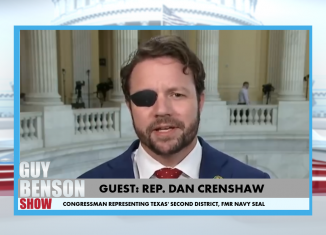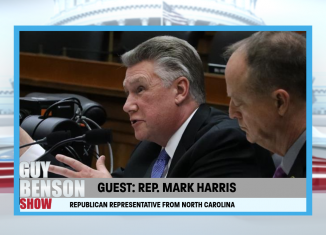Former Federal Prosecutor: This Is What Hunter Biden Should Have Been Charged With
Former federal prosecutor Brett Tolman gives his take on the Hunter Biden plea deal on The Guy Benson Show.
Listen Below:
Guy Benson: Our next guest is Brett Tolman. He is executive director of Right on Crime. Founder of the Tolman Law Group. And most relevant to this conversation, he was a U.S. attorney in Utah, and he’s been looking at the Hunter Biden case, the plea deal, the handling of it. And he told National Review everything about this case is wrong. Brett, welcome to the show. Glad to have you here.
Brett Tolman: Thanks for having me on.
Guy Benson: All right. When you say everything about this case is wrong, given your experience in this exact realm, what do you mean by that? Walk us through it.
Brett Tolman: So it’s hard to, I guess, capture just how bad this case is. And, you know, we’re hearing from whistleblowers and there’s all kinds of information about this. But I decided I wanted to first dig into these kinds of cases. And and I reviewed the data of over 189,000 possessed and illegal possession of firearms cases, for example, and could not find one single diversion. I myself personally presented hundreds of cases, firearms cases to a grand jury. And, you know, I cannot I cannot think of a single instance in which I would have been allowed to do a diversion of the the history and the background is something that people need to comprehend and understand about DOJ and firearms cases. Under Bush, they created a task force, national task force called Project Safe Neighborhoods, and they indicated that the DOJ would take a hard line, unforgiving line on firearms cases in order to do their part to get rid of illegal firearms in the country, and that that was adopted by every attorney general, including Merrick Garland. So when you see a case like this and they resolve the the the possession of a firearm with a diversion, there are thousands of individuals who got the same illegal possession of a firearm charge that are serving on average 40 months in federal prison.
Guy Benson: So when there is an argument. Or a claim sort of said breezily throughout the press, Oh, this is very normal. This is not special treatment. This is typical, you’re saying. Just the opposite is true. Am I hearing that correctly?
Brett Tolman: Yeah. To put a finer point on it. Of all the hundreds of thousands of criminal cases. You know, even though including all cases, not just firearms cases. All cases brought by DOJ, less than 1% are ever resolved with a diversion.
Guy Benson: Okay, So it’s rare. Very rare.
Brett Tolman: It is so rare. And it’s. That’s all cases. But then you add on top of it that it’s a firearms case and it is nonexistent. It is nonexistent.
Guy Benson: It isn’t. It exists here. It finally exists. And it involves the son of the president of the United States. Now, just I don’t really have the legal expertise that you have. Obviously, I’m not an attorney and you’re an accomplished one. Could the distinction be that the charge here or what they were looking most aggressively into was the lying on the background check? Form component of it. So maybe that’s the crime that got the diversion. They kind of looked the other way on the allegations of additional crimes, because my understanding is you’ve got video of Hunter Biden on film brandishing a weapon while doing drugs. I’m not, again, an expert, but that strikes me as illegal activity. Then there was the whole episode of his girlfriend and sister in law, the same person trying to get rid of the gun, dumping it in a garbage receptacle near a school. And then that got investigated. And there were allegations that the Secret Service inserted themselves inappropriately into that case on Hunter Biden allegedly tried to throw suspicion onto some local Hispanic men, saying that they were probably illegal. I don’t think any of that was actually in the realm of the charges. It was the lying on the form. Is that a charge that sometimes is resolved with these types of diversion resolutions?
Brett Tolman: So it’s not not typically. There’s two different charges they could bring. They could bring the lying and buying, which is vile, you know, that’s lying on that form. And it’s a felony. And, you know, it has typically less time in prison for for such a violation, but it’s still a felony. Or they could bring the user in possession. That’s a that’s a illegal, you know, possession of a firearm by someone who is using drugs. They chose to bring the illegal use of a firearm by a drug user. My guess guy on that is they did that so that they could tacitly say they were dealing with, you know, some aspect of the drug drug issues that are so prevalent on the laptop. But but even just stepping back and looking at this, it’s also it’s more than just what they did end up charging them with. It’s also what they did not charge him with. Right. So unusual.
Guy Benson: Yeah. Yeah. Say more about that because there is there’s the gun component and if you have more to say, by all means please do on the gun side of it. There’s also. On the taxes component. I’ve read from the whistleblower complaint and sworn testimony that they believe that they had this guy dead to rights on tax evasion, which is a more serious charge than failure to pay taxes. Failure to pay could be almost seen as oops, that’s you know, that’s a mistake. I was supposed to do this and I didn’t. And I should have and I had opportunities. But, you know, I screwed up. Evasion is a more proactive attempt, and my understanding is he was aggressively and intentionally hiding the nature of certain income and trying to say to the IRS and to the U.S. government, oh, this income is alone, even though it wasn’t. And the whistleblowers say and these are IRS guys, career respected officials at the higher levels of the investigative realms of the IRS. They were saying this was clearly tax evasion, which is a felony, and that the IRS was these investigators were pushing for felonies. But instead, again, they found this lesser charge that was a misdemeanor that likely wouldn’t involve jail time. Feel free to comment on on both of those aspects.
Brett Tolman: Yeah, you nailed it, actually. And and one thing that people don’t realize, the DOJ is governed by what are called attorney general policy memos. And under Ashcroft and again under Holder, they issued memos indicating that it was DOJ policy that the highest provable offense be charged where you have reasonable evidence to prove it. Now, what that means is they chose to do the exact opposite of their own internal policies the tax the tax charges that were brought. You cannot find an assistant U.S. attorney that has prosecuted tax cases in this country or investigated investigators who have investigated them, who would look at these facts and indicate that they believe a misdemeanor is the appropriate charge. When you have to do two things, when you have large sums of money and then you have what are called sophisticated means. Sophisticated means are ways in which they go about attempting to hide the nature of the income they receive or the location of the income, or they disperse it and they go to great lengths to try to to hide the amounts. We have all of that in In this case, you have dummy low fees that were created. You have money that’s flowing in that they’re not identifying the source. The LLC is don’t have legitimate businesses and then they end up paying out monies to a hunter and others. And now we know even Joe Biden. So the fact that they took five years to investigate and ended up with a couple of tax misdemeanors and a pretrial diversion on a felony, illegal possession of a firearm, that could have been I could have gathered that evidence in a week and a half, presented it and gotten an indictment in a matter of days.
Guy Benson: And here we are five years later. And this is apparently the result. And I know that there are questions about some of the other dealings and questions about money laundering, questions about not reporting as a foreign agent, which is also a crime. Things that aren’t even mentioned in this plea deal. And I know that we are told that this is still an open investigation. So maybe there are more shoes to drop or maybe not. And I keep saying we need more clarity on that. Is this really still actively open or are they saying it’s still open technically? So they have that excuse to not give information to Congress. I think we have a right to know that at this point, given the way that this case, at least so far, has been adjudicated. Just on what we know and not getting to some of the other allegations that may or may not be provable. And it sounds like there’s at least substantial evidence in those other realms. But looking only at the fact pattern, sir, on the gun, the purchase of the gun, the handling of the gun, etc., and the taxes, based on what you have gleaned and your knowledge of this case, let’s say there was a man when you were U.S. attorney, you were the federal prosecutor in Utah. There’s a man named Hunter Smith who lived in Salt Lake City or Provo or something. And this case landed on your desk. And you had these exact same facts only on the gun and only on the taxes. What in all likelihood, with imperfect knowledge. But based on what you know, what would the charges have looked like in your mind for Hunter Smith in your jurisdiction?
Brett Tolman: So we we would have been able to charge the tax tax violations as a felony. That would have been a no brainer and simple. And we would have also been able to charge money laundering, which is just the movement of money. And we would have also been able to charge conspiracy if there were others that were involved in moving the money or or the like. But we would not have we would not have the strength much to also be able to bring charges that are far more serious relative to the drugs than the guns. Think about this. If in fact, he has the gun and it’s out like the pictures show and he has given cocaine to some of the escorts he hired or the friends or others, then you have you have potential mandatory minimum in play that would get him at least five years in federal prison. You also have documented on the on the laptop the pictures and images. And reportedly some of the girls are underage. If that’s the case, there’s a mandatory minimum for production of child pornography.
Guy Benson: So without if that’s confirmed, we don’t know that, though, right? We don’t know that.
Brett Tolman: We don’t we do know there are pictures of him in the courts and there are allegations that they are some are underage. But let’s just say you have the gun and the the the what we do know is true and what he’s pleading to and we have the tax you would be looking at well over a decade in federal prison just on those charges.
Guy Benson: And yet we have what we have. And this news broke last week. Is there an explanation for this in your mind that is even plausible, let’s put it that way, a plausible explanation for the attempted resolution of this case, the way that they’ve gone after it, that does not involve political interference and or special treatment, given the last name of this person and his relationship to the president, the United States who oversees the Justice Department.
Bret Tollman: The only the only instance that I have personally been involved in, observed and authorized as a U.S. attorney that would that would dictate this kind of resolution would be if Hunter Biden was being signed up. As a cooperator, and it was going to provide evidence of all those that might have been involved and, you know, securing the millions of dollars from various countries. And he would be giving up that evidence. You might you might, in that instance, offer a deal such as this in exchange for his cooperation. But that is not what has happened. There’s no there’s no earmarks or signs that that’s what’s happening. Instead, you have statements indicating that this resolved the matter and that they’re wanting to put it behind them. You have DOJ indicating that they are moving on from the case. I think you’re probably right that they are indicating it’s a it’s an open investigation. But I think that’s not so much for purposes of withholding information from Congress. I think it’s required if they want to deny FOIA requests. So.
Guy Benson: Okay.
Bret Tollman: You know, that’s that’s your plot, in my view, that that would have been how you handle this kind of a case. You definitely would have put him in front of the grand jury. You would have threatened to put him away in prison for four decades and then secured his cooperation and tried to unravel the entire conspiracy and identify who all those coconspirators.
Guy Benson: This is not Smith, though. This is Hunter Biden. To my initial point. Last question. We have about a minute and a half left, maybe a tiny bit more. We have heard this whole hullabaloo involving allegations from the whistleblowers that David Weiss, who was the U.S. attorney in charge of this, that he was frustrated. He was telling people that he wanted to charge in other jurisdictions in California, in D.C. But the Biden appointee, U.S. attorneys, those places refused to cooperate, wouldn’t wouldn’t bring charges against the president’s son and that he wanted to be a special counsel. As a result, the Justice Department and the attorney general says that’s not true. He never said those things. He never wanted to be special counsel. He had full authority to charge wherever he wanted. There is some evidence that someone is lying and that there’s multiple witnesses to David Weiss saying these things in a meeting in 2022. In your experience, when it comes to jurisdiction, what do you what do you smell when you see that or you sniff that element of this whole controversy?
Brett Tolman: So what does not add up is that DOJ taking a position now that he was free to do what know, to bring any charges in any jurisdiction, that he could only do that with the help of main justice in DOJ because they have nationwide jurisdiction. So a prosecutor from Main Justice, Washington, D.C., could have been authorized by Merrick Garland to assist whites and go into California and bring those charges. But that’s not what happened. He’s saying that he was left to his own to try to convince the other U.S. attorneys to do to participate.
Guy Benson: And that is what he’s saying. And he wanted to have that authority. And Garland is saying, well, he did have that authority, but these two things don’t add up. There’s evidence on one side of this, at least so far. And again, to your point, it doesn’t make sense. And the quote that you gave to National Review, everything about this case is wrong, which sounds about right from where I sit, at least for now, based on what we know, which is why we’re following it. We so appreciate your time. Bret Tallman, former U.S. attorney in the District of Utah. He now is the executive director of Right on Crime. He’s got the Tolman Law Group. Brett, thank you.
Brett Tolman: Thank you, Guy







